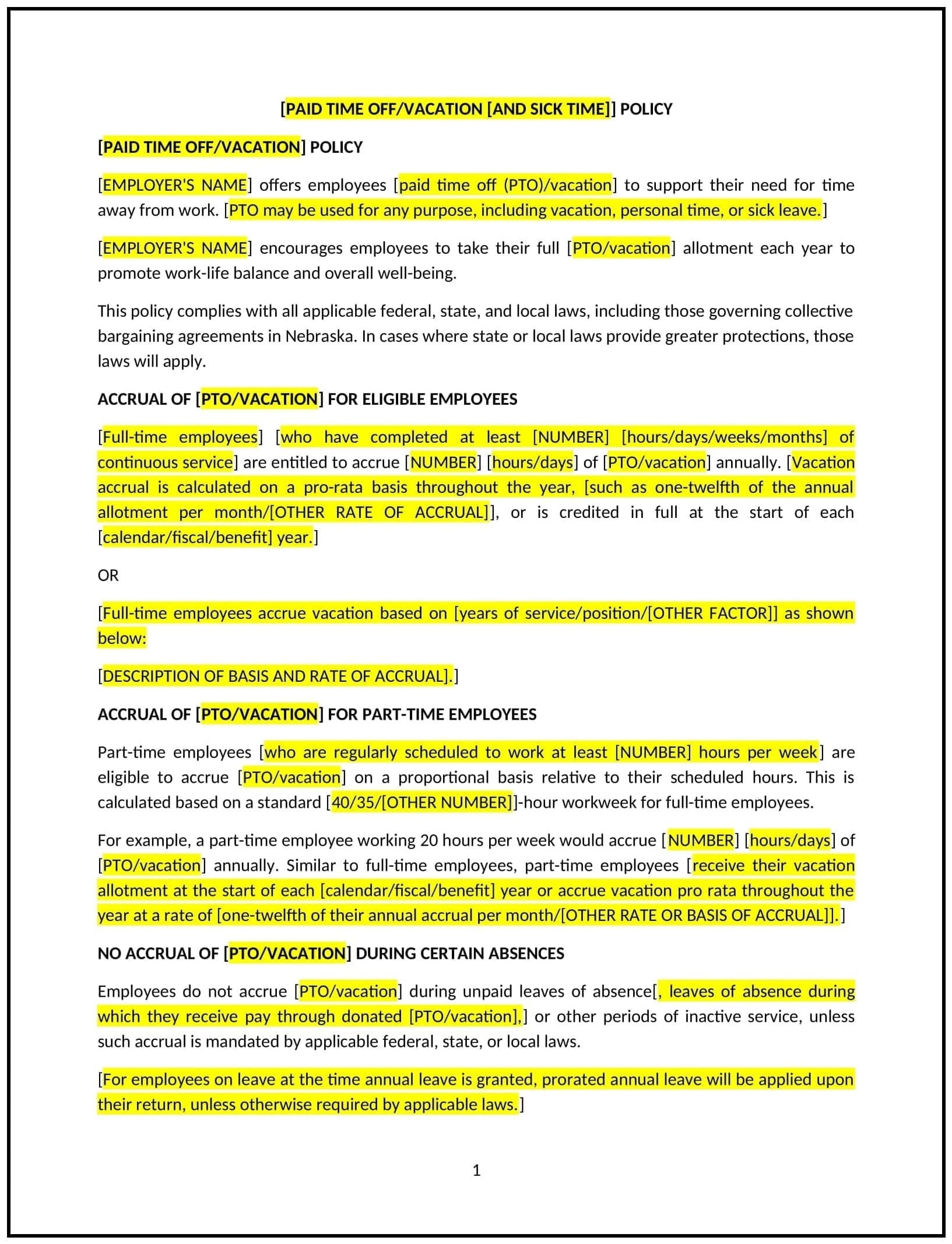Got contracts to review? While you're here for policies, let Cobrief make contract review effortless—start your free review now.

Customize this template for free
Vacation policy (Nebraska)
A vacation policy helps Nebraska businesses manage employee vacation time by outlining how vacation days are earned, requested, and used. This policy provides clear guidelines for employees on how to take time off, the process for submitting vacation requests, and how vacation days are accrued. It is designed to support work-life balance, ensure that employees take needed time off, and maintain operational efficiency.
By adopting this policy, businesses in Nebraska can create a structured approach to managing employee vacation time, supporting both employee satisfaction and the company’s ability to manage staffing levels effectively.
How to use this vacation policy (Nebraska)
- Define vacation eligibility: Specify which employees are eligible for vacation time, such as full-time employees, part-time employees, or those who have been with the company for a certain length of time. The policy should clarify whether vacation days are granted annually, accrued over time, or provided as lump sums.
- Establish vacation accrual: Outline how vacation days are earned, such as accrual based on the number of hours worked or as a set amount per month or year. The policy should specify the accrual rate and whether unused vacation days carry over from one year to the next.
- Set vacation request procedures: Specify how employees should request vacation time, including how far in advance requests should be submitted, whether approval is required, and how to submit the request (e.g., through an HR system or email). Establish deadlines for submitting requests to help with scheduling.
- Define maximum vacation days and carryover rules: Specify the maximum number of vacation days employees can accumulate. If unused vacation days carry over to the next year, define the limits and the timeframe within which employees must use them. Additionally, indicate whether employees forfeit vacation days if they exceed the carryover limit.
- Address paid vs. unpaid vacation: Clarify whether vacation days are paid or unpaid. The policy should specify if employees are paid their regular wages during vacation or if they must use PTO or unpaid time off for additional days.
- Provide guidelines for vacation during busy periods: Outline any guidelines or restrictions for taking vacation during peak business times or critical operational periods. Employees should be made aware of how their time off might impact business operations, and the policy should set expectations for staffing during these times.
- Ensure coverage and staffing: Set expectations for how work responsibilities should be handled during an employee’s absence. This may include preparing in advance to cover duties, informing managers or teams of vacation plans, or ensuring there are no disruptions to business operations.
- Review and update: Regularly review and update the policy to ensure it aligns with the company’s goals, employee needs, and Nebraska state regulations. This may include adjustments to accrual rates, carryover policies, or approval procedures based on business feedback and legal requirements.
Benefits of using this vacation policy (Nebraska)
This policy provides several benefits for Nebraska businesses:
- Promotes work-life balance: A clear vacation policy helps employees take the time off they need to recharge, promoting a healthy work-life balance and preventing burnout.
- Improves employee retention: Offering vacation time and a structured process for requesting time off can improve employee satisfaction and retention, as employees appreciate the opportunity to take personal time.
- Ensures operational efficiency: By setting clear rules for how vacation days are accrued, requested, and managed, businesses can better plan for employee absences and ensure that staffing levels are maintained.
- Supports employee productivity: When employees take regular vacations, they return to work refreshed and more productive, contributing to the overall success of the company.
- Reduces disputes: A well-defined vacation policy helps prevent misunderstandings or disputes about vacation time, ensuring that employees know their rights and responsibilities when it comes to taking time off.
Tips for using this vacation policy (Nebraska)
- Communicate the policy clearly: Ensure all employees are aware of the vacation policy and how to request time off. Include the policy in employee handbooks, onboarding materials, and internal communications.
- Encourage employees to plan ahead: Encourage employees to request vacation time well in advance, particularly during busy periods, to ensure that there is sufficient coverage and that staffing levels are maintained.
- Track vacation accrual and usage: Keep accurate records of employees' vacation accruals and usage to ensure that the company stays within legal limits and that employees do not lose accrued time. An automated HR system can help streamline this process.
- Be flexible with vacation requests: While it’s important to ensure that work gets done, businesses should also be flexible with employees’ vacation requests when possible, to foster goodwill and ensure employees have time to rest.
- Review the policy regularly: Periodically review the vacation policy to ensure it aligns with the company’s goals, employee needs, and any changes in Nebraska state law regarding paid time off or vacation.